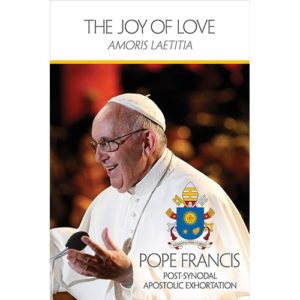“I do not recommend a rushed reading of the text” (Amoris Laetitia 7). Pope Francis gives this great advice in his Apostolic Exhortation Amoris Laetitia, The Joy of Love, which is certainly the most important to follow for interpreting the document as a whole. The pope encourages families to read the document “patiently and carefully” (Ibid). And it seems clear that Pope Francis desires all people to read it since, “everyone should feel challenged by Chapter Eight” (Ibid., emphasis added).
It contains an authentic vision for marriage. Pope Francis constantly challenges culturally accepted norms which have hurt family life. This document is strange in that you could find yourself saying “yes, yes yes,” in many instances. But then after reading the document in its entirety, several ambiguous points leave you feeling uneasy for their lack of clarity. Let’s start with the clarity.
The pope warns against “an extreme individualism which weakens family bonds…” (AL 33). Pope Francis thanks families who remain faithful to the Gospel. He encourages and speaks warmly about parents who raise children with special needs (cf. AL 47). The pope is clear that same-sex relationships cannot be equated to marriage because, “No union that is temporary or closed to the transmission of life can ensure the future of society” (AL 52). Later Pope Francis affirms, “there are absolutely no grounds for considering homosexual unions to be in any way similar or even remotely analogous to God’s plan for marriage and family” (AL 251). The pope speaks out against “various forms of an ideology of gender that ‘denies the difference and reciprocity in nature of a man and a woman and envisages a society without sexual differences…’” (AL 56). He then says, “Let us not fall into the sin of trying to replace the Creator” (AL 56).
Pope Francis constantly refers to his predecessor, Blessed Paul VI, in citing Humanae Vitae. Spouses must respect the procreative meaning of sex and, “no genital act of husband and wife can refuse this meaning…” (AL 80). Artificial contraception is not a possibility. Similarly, the pope condemns abortion (cf. AL 83). In rather strong words he explains to parents that, “it matters little whether this new life is convenient for you, whether it has features that please you, or whether it fits into your plans and aspirations” (AL 170). The couple must respect life in all circumstances.
Chapter Four serves as an exegesis of St. Paul’s great explanation of love found in 1 Corinthians 13. The pope gives practical advice, “never to let the day end without making peace in the family” (AL 104), which calls to mind Scripture (cf. Ephesians 4:26). In this chapter he challenges how the word “love” is “commonly misused” (AL 89). This is clear in the fact that a husband could say “I love my wife and I love that song” in the same sentence. It does not require sacrifice to “love” a song, but it does require self-gift and personal sacrifice to love one’s spouse.
 At various points Pope Francis clearly and unambiguously reaffirms that a marriage bond is indissoluble and he also explained that this should be seen as a gift, not a burden (cf. AL 62). The pope actually quotes the Old Testament book of Malachi, “For I hate divorce, says the Lord” (Malachi 2:14-16; AL 123), and later goes on to proclaim that, “Divorce is an evil and the increasing number of divorces is very troubling” (AL 246). He minces no words when he describes the reality of divorce and also the affect it can have on children.
At various points Pope Francis clearly and unambiguously reaffirms that a marriage bond is indissoluble and he also explained that this should be seen as a gift, not a burden (cf. AL 62). The pope actually quotes the Old Testament book of Malachi, “For I hate divorce, says the Lord” (Malachi 2:14-16; AL 123), and later goes on to proclaim that, “Divorce is an evil and the increasing number of divorces is very troubling” (AL 246). He minces no words when he describes the reality of divorce and also the affect it can have on children.
But there are some statements in this document that are ambiguous. Please call to mind that the pope has encouraged everyone to read Chapter Eight of Amoris Laetitia. And I propose that that is the problem, not everyone has the ability to interpret what the pope is suggesting. At times it seems you need a degree in Moral Theology or Canon Law to get at the heart of what he’s saying. There’s ambiguity around the issue of what constitutes a mortal sin. “Hence it can no longer simply be said that all those in any ‘irregular’ situation are living in a state of mortal sin and are deprived of sanctifying grace. More is involved here than ignorance of the rule” (AL 301). In other words, some people who commit grave sins are not guilty of mortal sin, beyond cases of invincible ignorance. Pope Francis does cite the Catechism for this proposal: “Imputability and responsibility for an action can be diminished or even nullified by ignorance, inadvertence, duress, fear, habit, inordinate attachments, and other psychological or social factors” (CCC 1735). One problem with what the pope proposes is that he doesn’t seem to address the fact that any sin, whether venial or mortal, will affect the soul and the individual’s relationship with God, albeit in different ways. The Catechism also teaches, that venial sin, “impedes the soul’s progress in the exercise of the virtues and the practice of the moral good” (CCC 1863).
Many people were turning to the pope for clarity on whether or not civilly divorced and remarried Catholics could receive Holy Communion, even though this has been addressed by St. John Paul II (cf. Familiaris Consortio 84). The pope encourages help in the Sacraments. He reminds priests that the confessional is not a “torture chamber” and that the Eucharist “is not a prize for the perfect, but a powerful medicine and nourishment for the week” (AL 305 [footnote 351]). However, we don’t get a clear explanation of whether or not civilly divorced and remarried persons can receive Holy Communion. And again, keep in mind that the pope encouraged all people to read this section of the document.
Amoris Laetitia is a document which provides great encouragement to families. Certain passages merit extremely close reading, such as the passages about civilly divorced and remarried Catholics. But you can’t judge the entire document based on a couple of paragraphs and footnotes. Overall it was a joy to read it and I encourage you to do so “patiently and carefully.” Let’s continue to ask the Holy Spirit to guide us as we read and unfold what Pope Francis has taught us in The Joy of Love.
Edward Trendowski is Director of the Office of Faith Formation for the Diocese of Providence and teaches pastoral theology for Saint Joseph’s College Online.


